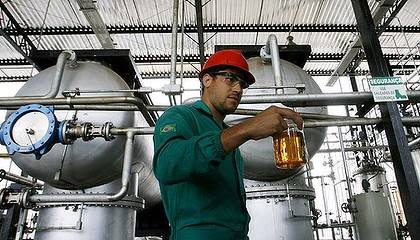
Biodiesel is considered a "green" fuel. It is made from plant-based oils such as sunflower, flax, and soybean oils or the ubiquitous "vegetable oil".
But you can't just pour vegetable oil into your gas tank. Biodiesel is a mix of vegetable oil and alcohol (usually ethanol, which is derived from corn). The glycerin inherent in the vegetable oil needs to be separated out, and then the biodiesel must be mixed with the alcohol in the right proportions. You have to have a diesel engine for this green fuel to work.
Pros
* Biodiesel is renewable. Unlike fossil fuels, which will eventually run out, biodiesel is plant based, so the source of the oil can be grown again.
* Diesel engines do well with the solvency and lubricating effect of biodiesel. Therefore, your engine maintenance costs will be less.
* You will save a great deal on fuel. Biodiesel is cheap. Some people "harvest" the massive amounts of cooking oil that restaurants throw out.
* You can recycle your household cooking oil and use it in your car or truck.
* Biodiesel is biodegradable, which means it will break down in the environment.
* No toxic emissions are produced when biodiesel is used.
* You can make fuel from local sources. The widespread use of biodiesel would cut down on the importation of oil from other countries.
Cons
* Only diesel-powered vehicles can be converted to biodiesel. You would have to change out your engine if you wanted to convert your gasoline vehicle to a biodiesel one.
* There are concerns that as more people switch to biodiesel, the increased demand could have a negative environmental impact by decreasing biodiversity. More and more farmland will have to be used to grow the crops that produce the oil, meaning less farmland will be available for food crops and other plants.
* You have to make biodiesel yourself, which takes time and can be dangerous.
* If you want to use straight oil without the mixing and separating of prepared biodiesel, you will have to modify your diesel engine by adding a second fuel tank and a heater. Vegetable oil is not liquid enough to start an engine unless it is heated first – a real disadvantage in cold climates.
* When you are on the road, you will have to figure out how to take along enough fuel to sustain your vehicle. Or you need to plan your route so that you can stop by various restaurants and collect their used cooking oil. You still have to filter it and mix it on the road.

